Regularly scheduled service to Asheville ended in 1975; since at least 1995, advocates have been pushing to bring back the trains.


Regularly scheduled service to Asheville ended in 1975; since at least 1995, advocates have been pushing to bring back the trains.

The roughly 19-mile greenway along an unused rail line between Brevard and Hendersonville, first proposed in 2009, received about $46 million toward its estimated $53.5 million construction cost.

Last month, Rep. Chuck Edwards convened a nine-member agricultural advisory board to provide a variety of perspectives as he advocates for the region’s interests in the farm bill.

A new report by conservation nonprofit MountainTrue finds that E. coli concentrations in the French Broad River near Asheville regularly exceed eight times the standard considered safe for swimming by the federal Environmental Protection Agency.
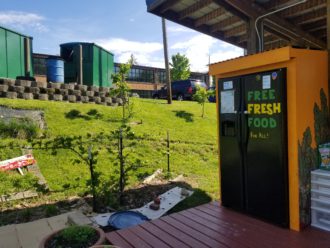
This fiscal year, Asheville Buncombe Food Policy Council received a $5,000 grant from Buncombe County to help bring more community fridges on line. But ABFPC says it has run into some challenges from the city about the implementation of the initiative.

Snorkel trail to put visitors face-to-face with underwater river dwellers.
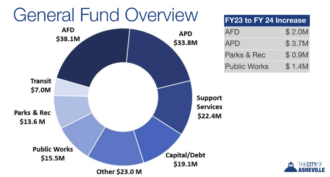
In her proposed budget for fiscal year 2023-24, City Manager Debra Campbell wants to give the Asheville Police Department a bump of almost $4 million — an increase of more than 13% over current funding levels.

Along with the economic impact, the loss of the mill will also harm sustainable forestry in Western North Carolina, says EcoForesters Co-Director Andy Tait. The Canton facility, Tait explains, was WNC’s last remaining end user of pulpwood.

Asheville is one of 18 communities across the U.S. and Chile selected for the work, which will help scientists understand how cities experience extreme heat.

Similar to the craft beer industry, local hemp growers and sellers are finding some success by formulating their own products, creating a strong brand and selling directly to consumers.

Nearly a year after its original timeline, Asheville’s government is preparing to ratify a Municipal Climate Action Plan. The city’s Sustainability Advisory Committee on Energy and the Environment unanimously recommended adoption of the plan Feb. 21. City Council is expected to approve it at its meeting Tuesday, March 28. As previously reported by Xpress, the […]

Financing begins to come together to shore up McCormick Field in order to meet MLB standards.
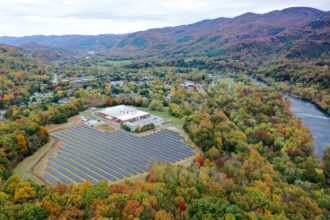
The microgrid includes 2 megawatts of solar panel capacity and 4.4 MW of battery storage. Those resources are enough to power the entire town for an extended period if its connection to the main grid is disrupted.

This new funding, to be voted on by City Council during the regular meeting of Tuesday, Feb. 14, would come on top of more than $1.4 million the city has already budgeted for bicycle and pedestrian infrastructure along the I-26 corridor.
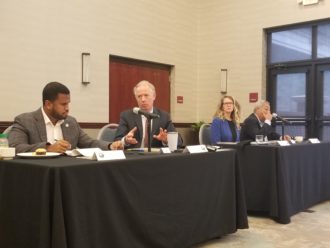
Buncombe first hired Ward and Smith last May, agreeing to pay the firm $72,000 annually to advocate for the county’s interests at the state legislature. A Jan. 30 gathering at the DoubleTree hotel in Biltmore Village marked the first extended public discussion of the lobbyists’ work since that contract was inked.
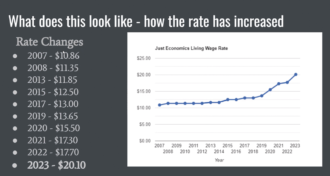
Under the new system, similar to that employed by the national Living Wage For Us campaign, businesses could remain in the Living Wage Program if they agreed to an $18 hourly minimum wage and “committed annual increases” toward a $20.10 wage rate.

On Dec. 30, the nonprofit completed the purchase of 34 acres in Brevard to expand the preserve. The new land will bolster the existing 395-acre park, owned by the city of Brevard, which connects to the Pisgah National Forest.

Asheville City Council will consider establishing an “independent review committee to analyze the events and circumstances leading up to, and throughout the duration of, the recent prolonged water outage.” The group would evaluate Asheville’s emergency response, identify infrastructure needs and recommend policy changes to make the city more resilient.
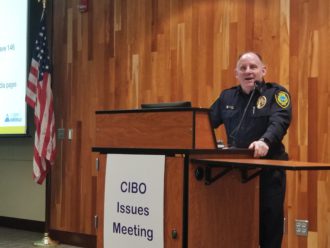
Asheville Police Department Chief David Zack and Vice Mayor Sandra Kilgore filled in the Asheville-based trade group Jan. 6 about the city’s recent efforts to address dozens of vacancies among the APD’s patrol staff.

During the Jan. 3 meeting of the Buncombe County Board of Commissioners, Asheville Mayor Esther Manheimer fielded questions about the chain of events that left tens of thousands without water over the Christmas and New Year’s holidays.

Xpress reached out to the area’s elected officials, activists and community leaders to learn more about what they took away from 2022’s political action.